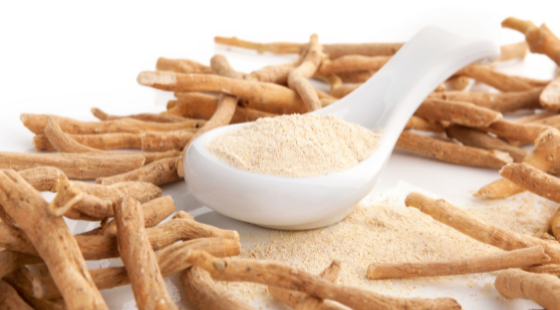
Ashwagandha has been used for over 3,000 years in ancient Ayurvedic medicine practices to help relieve stress, increase energy levels, improve concentration and many more benefits. It’s now grown in popularity in the western world over recent years for its various health benefits as well (1).
So, let’s have a look at some of the amazing health properties that Ashwagandha can provide us!
Top 10 Health Benefits of Ashwagandha
- Balance Blood Sugar
Ashwagandha can reduce blood sugar levels in both healthy people and those with diabetes (2, 3) - Treat Cancer
Ashwagandha can help treat several types of cancer, including breast, lung, colon, brain, and ovarian cancer. The mechanism of action is through inducing apoptosis, which is the programmed death of cancer cells and impeding the growth of new cancer cells (4, 5, 6, 7) - Reduce Stress
Ashwagandha can help to reduce stress and levels of cortisol by up to 30% in chronically stressed individuals (8) - Reduce Anxiety
Ashwagandha can assist in reducing anxiety and improving sleep issues (9) - Improve Depression
Ashwagandha can help reduce symptoms of depression (10) - Improve Male Fertility
Ashwagandha can help boost testosterone and fertility in men by improving sperm count and sperm quality (11,12) - Improve Body Composition
Ashwagandha may help improve muscle strength, muscle mass and body composition and reduce body fat percentage (13, 14) - Reduce Pain and Inflammation
Ashwagandha can reduce inflammation, including inflammatory markers such as natural killer cells and c-reactive protein, and can act as a natural pain reliever (15, 16) - Protect Cardiovascular Health
Ashwagandha can reduce total cholesterol, LDL (bad) cholesterol and triglycerides in the blood (17, 18) - Improved Cognitive Function
Ashwagandha can improve memory, reaction time and attention span for many individuals (19)
Ashwagandha Risks
While it is generally considered safe, large doses of Ashwagandha might cause stomach upset, diarrhea, and vomiting. Liver problems might occur, but this is very rare.
Ashwagandha may also interact with thyroid, blood sugar and blood pressure medications and is not advised to consume when pregnant or breastfeeding. Ashwagandha might cause the immune system to become more active, and this could increase the symptoms of auto-immune diseases. For this same reason, Ashwaganha is not recommended for people that are on immune suppressant drugs. If you have one of these conditions, it’s best to avoid using Ashwagandha.
Ashwagandha may slow down the central nervous system. Healthcare providers worry that anesthesia and other medications during and after surgery might increase this effect. Stop taking Ashwagandha at least 2 weeks before a scheduled surgery (20)
How Do I Take Ashwagandha?
The recommended dosage of Ashwagandha depends on the type of supplement because extracts are more potent than whole Ashwagandha root or leaf powder. So, it is important to follow instructions on labels or seek advice from a qualified health professional. Standardized Ashwagandha root extract is commonly taken in 450–500mg capsules once or twice daily.
You can purchase whole Ashwagandha powder and add in your smoothies or sprinkle on your oatmeal or yoghurt. You can purchase If consuming Ashwagandha as a tea, it can be difficult to determine if you are getting enough to establish a therapeutic dose. However, if you’re just looking for a supportive herbal addition to your diet, tea or Ashwagandha Moon Milk are great options!
For more Ashwagandha supplement options, check out our online dispensary. This is one of our favourites:
If you have taken Ashwagandha in the past, or opt to try it now, come find us over on Facebook or Instagram and let us know how it worked for you!
REFERENCES
1. https://pubmed.ncbi.nlm.nih.gov/19633611/
2. https://blog.priceplow.com/wp-content/uploads/2014/08/withania_review.pdf
3. https://pubmed.ncbi.nlm.nih.gov/23125505/
4. https://pubmed.ncbi.nlm.nih.gov/17003952/
5. https://pubmed.ncbi.nlm.nih.gov/17003952/
6. https://pubmed.ncbi.nlm.nih.gov/20840055/
7. https://pubmed.ncbi.nlm.nih.gov/24046237/
8. https://blog.priceplow.com/wp-content/uploads/2014/08/withania_review.pdf
9. https://pubmed.ncbi.nlm.nih.gov/23439798/
10. https://pubmed.ncbi.nlm.nih.gov/23439798/
11. https://pubmed.ncbi.nlm.nih.gov/19789214/
12. https://pubmed.ncbi.nlm.nih.gov/23796876/
13. https://pubmed.ncbi.nlm.nih.gov/26609282/
14. https://pubmed.ncbi.nlm.nih.gov/21170205/
15. https://pubmed.ncbi.nlm.nih.gov/26397759/
16. https://pubmed.ncbi.nlm.nih.gov/19504465/
17. https://pubmed.ncbi.nlm.nih.gov/16713218/
18. https://blog.priceplow.com/wp-content/uploads/2014/08/withania_review.pdf
19. https://pubmed.ncbi.nlm.nih.gov/28471731/
20. https://www.webmd.com/vitamins/ai/ingredientmono-953/ashwagandh





